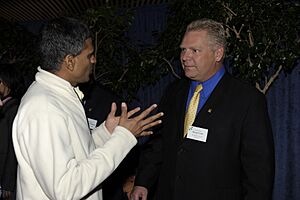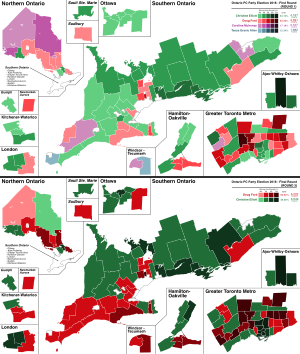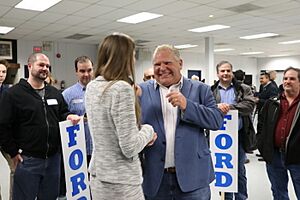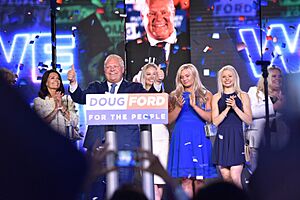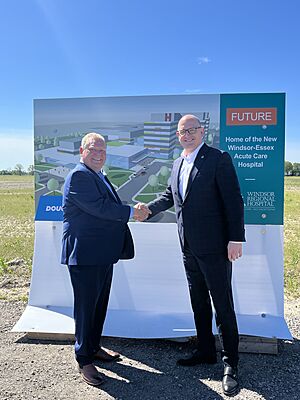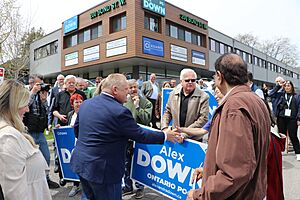Doug Ford facts for kids
Quick facts for kids
Doug Ford
|
|
|---|---|
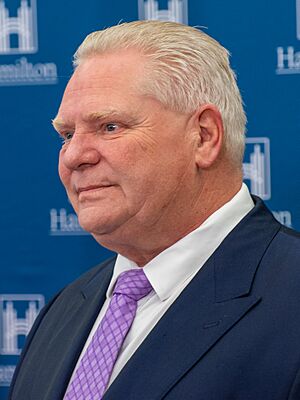
Ford in 2024
|
|
| 26th Premier of Ontario | |
| Assumed office June 29, 2018 |
|
| Monarch | |
| Lieutenant Governor |
|
| Deputy |
|
| Preceded by | Kathleen Wynne |
| Minister of Intergovernmental Affairs | |
| Assumed office June 29, 2018 |
|
| Premier | Himself |
| Preceded by | Kathleen Wynne |
| Leader of the Progressive Conservative Party of Ontario | |
| Assumed office March 10, 2018 |
|
| Preceded by | Vic Fedeli (interim) |
| Member of the Ontario Provincial Parliament for Etobicoke North |
|
| Assumed office June 7, 2018 |
|
| Preceded by | Shafiq Qaadri |
| Toronto City Councillor for Ward 2 Etobicoke North |
|
| In office December 1, 2010 – November 30, 2014 |
|
| Preceded by | Rob Ford |
| Succeeded by | Rob Ford |
| Personal details | |
| Born |
Douglas Robert Ford Jr.
November 20, 1964 Etobicoke, Ontario, Canada |
| Political party | Progressive Conservative |
| Spouse | Karla Middlebrook |
| Children | 4 (including Krista) |
| Parents |
|
| Relatives |
|
| Residences | Princess Gardens, Etobicoke, Toronto |
| Alma mater | Humber College (no degree) |
| Occupation |
|
Douglas Robert Ford Jr. (born November 20, 1964) is a Canadian politician and businessman. He is currently the 26th premier of Ontario and the leader of the Progressive Conservative Party since 2018. He represents the Toronto area of Etobicoke North in the Legislative Assembly of Ontario.
Doug Ford co-owns a printing business called Deco Labels and Tags with his brother Randy. Their father, Doug Ford Sr., started this company. Their father also served as a Member of Provincial Parliament (MPP) from 1995 to 1999. Before becoming premier, Doug Ford was a Toronto city councillor for Ward 2 Etobicoke North from 2010 to 2014. During this time, his brother, Rob Ford, was mayor of Toronto. Doug Ford also ran for mayor of Toronto in 2014, finishing second.
In 2018, Ford entered provincial politics. He won the leadership election for the Progressive Conservative Party. He then led the party to win two majority elections in 2018 and 2022. As premier, Ford has worked on public transportation, changed the size of Toronto city council, and guided the province through the COVID-19 pandemic. He also passed Bill 60 to allow more private healthcare services.
Contents
- Early Life and Family
- Business and First Steps in Politics
- City Politics in Toronto
- Provincial Politics
- Premier of Ontario
- Political Views
- Personal Life
- See also
Early Life and Family
Doug Ford was born in Etobicoke, Ontario. He was the second of four children. His parents were Doug Bruce Ford Sr. and Ruth Diane Ford. His grandparents on his father's side came from England. He finished grade twelve at Scarlett Heights Collegiate Institute. He then went to Humber College for two months but did not finish his studies.
Business and First Steps in Politics
In the 1990s, Ford started working at Deco Labels and Tags. His father had started this company in 1962. The company makes labels for grocery products. Doug Jr. became the company's president in 2002. He helped the company grow into Chicago.
Ford's first political involvement was helping with his father's campaigns. His father ran as a PC MPP candidate in 1995 and 1999. Doug also helped his brother Rob with his city council campaigns. He later helped Rob win the mayoral election in 2010.
City Politics in Toronto
Toronto City Councillor
On October 25, 2010, Ford was elected as a city councillor in Toronto for Ward 2. He took over from his brother, Rob, who became mayor. Doug Ford announced that he would donate his yearly salary to community groups.
As a city councillor, Ford supported privatizing garbage collection in some areas. He also voted to make the Toronto Transit Commission an essential service. He worked to reduce the budget for city councillors' offices.
City Boards and Projects
Ford served on the board of Build Toronto. This group develops and sells city land. He was also a director for the Canadian National Exhibition. He served on several city committees.
In 2011, Ford suggested a different plan for the Port Lands area of Toronto. This plan included a monorail and a very large Ferris wheel. However, the city council did not approve his plan.
2014 Mayoral Election
In June 2013, Ford said he would not run for city councillor again. He was frustrated with city politics. People thought he might run for provincial politics. However, he decided not to run in the 2014 provincial election. He wanted to focus on his brother Rob's re-election campaign for mayor.
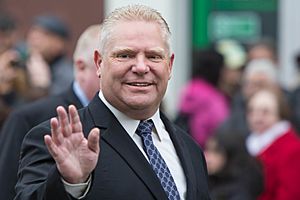
After his brother Rob had to leave the mayoral race due to illness, Doug Ford decided to run for mayor himself. He kept much of the support his brother had. He finished second in the election, losing to John Tory.
After the mayoral election, some wondered if Ford would run for leader of the Progressive Conservative Party of Ontario. He considered it but decided not to. He supported Christine Elliott for the leadership role instead.
Integrity Commissioner Review
In 2016, the City of Toronto's integrity commissioner looked into Ford's time as a councillor. The commissioner found that Ford had used his influence improperly. This was related to two companies that were clients of his family's business. Since Ford was no longer a councillor, no punishment was given.
2018 Mayoral Election
On September 9, 2017, Ford announced he would run for mayor of Toronto in 2018. He said he was doing it "for Robbie," referring to his late brother. However, on February 1, 2018, Ford changed his mind. He decided to focus entirely on running for leader of the Ontario PC Party instead.
Provincial Politics
2018 Progressive Conservative Leadership Campaign
| Candidate | Doug Ford |
|---|---|
| Affiliation | Progressive Conservative Party of Ontario |
| Status | Won |
| Headquarters | Toronto |
| Slogan | Strong Party, Strong Ontario |
After Patrick Brown resigned as leader, the Progressive Conservative Party needed a new leader. Ford was the first to announce he would run on January 29, 2018. He also said he would run for the provincial seat in Etobicoke North.
Ford promised to represent the interests of Northern Ontario. He called his opponents "insiders" and "political elites." He pledged to develop resources in the Northern Ontario Ring of Fire. He also promised to bring back the Northlander train service.
Ford said the Ontario healthcare system was "broken." He shared his brother Rob's difficult hospital experience. He believed the province should help Northern Ontarians travel for medical care. He also wanted to increase support for small and medium-sized hospitals.
On March 10, Ford won the PC leadership on the third ballot. The results were very close. After a recount, he was declared the winner. Christine Elliott conceded and supported Ford as leader. On March 27, 2018, Ford became the party's candidate in Etobicoke North.
2018 General Election
In March 2018, the Liberal government proposed a budget with new spending. Ford called it a "spending spree." He said he would simplify the Conservative plan into five points. These points focused on health, education, creating jobs, ending the cap and trade program, and lowering electricity rates.
Ford said he would help manufacturing in Ontario. He planned to ease rules, cut taxes, and ensure fair electricity rates. He also criticized the Liberal government for not developing the Northern Ontario Ring of Fire quickly enough.
Ford announced that if elected, his government would let Hamilton City Council use money for transit on other infrastructure. This was for Hamilton's proposed rapid transit system. Hamilton's mayor, Fred Eisenberger, disagreed with this idea.
Ford and the PC Party received support from former mayors Mel Lastman and Hazel McCallion. Some compared Ford to U.S. President Donald Trump. Ford rejected these comparisons but praised some of Trump's policies.
Ford led the PC Party to a majority government on June 7, 2018. They won 76 out of 124 seats in the Legislative Assembly of Ontario. This included his own riding of Etobicoke North. Ford had been PC leader for less than 100 days when his party won the election.
Premier of Ontario
Ford became premier on June 29, 2018. The ceremony was held outdoors at Queen's Park. He was the first new MPP to become premier since 1934.
Provincial Money Matters
Ford's government cancelled a basic income pilot project. He supports using natural staff turnover to reduce government jobs. He believes in hiring independent auditors to check government spending. Some critics say Ford's spending has been too high, increasing Ontario's debt.
Beer Pricing
Ford promised "buck-a-beer" during his campaign. He lowered the minimum price of beer from $1.25 to $1. However, not many breweries or stores adopted this lower price.
Tax Credit for Low-Income Earners
In November 2018, the government introduced a tax cut called LIFT. This could save individuals up to $850 a year. A person working full-time at minimum wage would pay no provincial income tax. However, they would still pay federal income tax. In September 2018, Ford's government froze the minimum wage at $14 per hour.
Cap and Trade Program
On June 15, 2018, Ford announced his government would end the province's cap and trade program. This program was designed to fight climate change and raised money for environmental projects. Ford promised to lower gas prices by 10 cents per litre by ending it. A court later ruled that the government broke the law by not holding public consultations first. Because Ontario left the cap and trade program, a federal carbon tax was automatically put in place.
Carbon Tax
Ford warned that the federal carbon tax would increase gas prices. The price of gas did go up slightly after the tax. However, fuel price analysts say that overall gas prices have dropped due to lower oil prices.
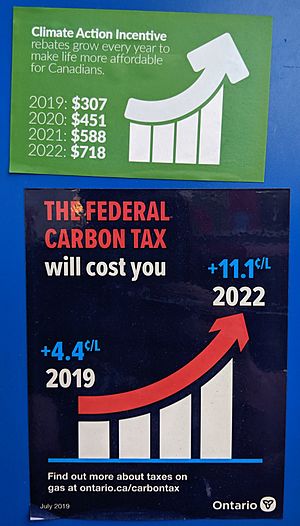
Ford has worked with other provincial premiers to fight the federal carbon tax. He believes the federal law is against the constitution. He spent $30 million to challenge the law. This included printing anti-carbon tax stickers for gas stations. A court later ruled that forcing gas stations to display these stickers was unconstitutional.
In March 2021, the Supreme Court of Canada ruled that the federal government can introduce pollution pricing for provinces without their own system.
Ontario's Debt
Doug Ford promised a balanced budget in 2018. However, Ontario's debt has increased by $86 billion since he took office. This is a larger increase than under his predecessor.
Healthcare in Ontario
In 2018, Ford supported publicly funded healthcare. He believed funding should increase for 30,000 more long-term care beds. In 2019, he started the Ontario Seniors Dental Care Program. This program fully pays for dental costs for low-income seniors.
Ontario Health Agency
The Ford government created the Ontario Health agency in 2019. The goal was to bring healthcare services together. The province hopes to save $350 million a year.
Bill 60: Your Health Act
Ford has been accused of trying to privatize healthcare. In August 2022, he suggested using more private healthcare services. This was to help with hospital staff shortages.
In May 2023, Ford's government passed Bill 60, the Your Health Act. This law allows private clinics to perform more surgeries and procedures. These include cataract surgeries and MRI scans. These services are still covered by the Ontario Health Insurance Plan (OHIP). The government says this is needed to reduce long waiting lists for surgeries. Critics worry about the cost and impact on public hospitals.
Emergency Room Closures
In 2023, Ontario had 1,199 emergency room (ER) closures. Most of these were in rural areas. This problem grew in 2024. Staff shortages, especially of nurses, were the main reason. The Ford government has pledged money to address these closures. They are investing in educating more nurses.
Education in Ontario
After taking office in 2018, Ford proposed cutting teaching jobs. This was to save money. He also cancelled some programs, like free prescriptions for youth. He ended free tuition for low-income students but reduced tuition fees by 10 percent.
Ford believes that financial literacy should be taught more in schools. He also thinks Ontario's math curriculum should focus more on basic math and memorization.
Ford used a special law to end a long strike at York University in 2018. He also ordered universities and colleges to create free-speech policies. If they did not, they could lose funding.
By June 2019, the Ford government had cut or reduced funding for many school programs. These included after-school jobs for youth and tutors in classrooms. They also increased class sizes.
2022 CUPE Strike
Ford's government introduced Bill 28, the Keeping Students in Class Act, in November 2022. This bill forced a contract on the Canadian Union of Public Employees (CUPE). It also made it illegal for them to strike. The bill used a special clause to prevent court challenges. Many groups, including other unions and the Prime Minister, criticized this law.
Despite the bill, CUPE went on strike. This led to school closures and protests. Ford later announced he would cancel Bill 28 and restart talks with CUPE.
City Affairs
Ford was a Toronto city councillor when his brother Rob was mayor. He has been accused of interfering in Toronto's politics. This includes removing bike lanes and reducing the size of the city council.
Toronto City Council
Ford believes the province can change the size of city councils. His government passed a law to reduce the number of wards in Toronto City Council. When a court said this was unconstitutional, Ford used a special clause to bypass the ruling. The Ontario Court of Appeal later sided with Ford. The case is now being considered by the Supreme Court of Canada.
Public Transit
Ford supports subways. He believes the provincial government should control the Toronto subway. In 2020, Ford and Toronto Mayor John Tory agreed that the province would take over planning and building major subway extensions. Construction began on the Hurontario LRT line in Mississauga and Brampton. All subway projects started by June 2024. Ford has been criticized for delays in opening the Eglinton Crosstown line.
City Spending Cuts
In 2019, the government announced changes to how it shares costs with Toronto Public Health and Toronto Paramedic Services. This would mean cuts for Toronto. City officials criticized these cuts, saying they would lead to fewer services or higher taxes. Ford later said the province would keep the old cost-sharing arrangement for a while.
Bill 66
In December 2018, the Ford government introduced Bill 66. This bill allows cities to ask the province to override rules that stop businesses from moving into an area. Environmental groups worried this could bypass laws protecting clean water and sensitive lands.
Strong-Mayor Powers
In September 2022, Ford's government passed the Strong Mayors, Building Homes Act. This law gives more power to the mayors of Toronto and Ottawa. It gives them more control over city budgets and hiring. They can also veto laws that go against provincial goals.
Bike Infrastructure
In September 2024, it was reported that Ford's government was working on a law to limit new bike lanes. This would affect lanes that require removing space for cars. Ford believes bike lanes increase traffic. He announced that new bike lanes on major roads would need provincial approval. He also said he would remove bike lanes from some main streets in Toronto. This bill, called the Reducing Gridlock, Saving you Time Act, passed in November 2024.
Hydro (Electricity)
During his election campaign, Ford promised to lower Ontario's electricity rates by 12 percent. He said he would use money from the province's ownership of Hydro One to help lower rates.
Ford criticized Hydro One's CEO, Mayo Schmidt, over his salary. He called on the company's board of directors to resign. Ford opposed his predecessor's decision to privatize Hydro One, but he does not plan to reverse it. His government passed a law to make salaries of Hydro One executives public and reduce them. On July 11, 2018, Mayo Schmidt and the entire board resigned.
In December 2018, U.S. regulators rejected Hydro One's plan to buy another company, Avista. They cited "political risks in Ontario." Ford denied he was to blame for this decision.
COVID-19 Pandemic Response
First Outbreak
In December 2019, a new virus, COVID-19, started in China. It spread worldwide and became a pandemic. The first case in Canada was in Ontario in January 2020.
On March 17, Ford declared a state of emergency in Ontario. This closed bars, restaurants (except for takeout), libraries, theatres, and schools. Public gatherings were limited. On March 23, Ford ordered all "non-essential" businesses to close.
On March 25, Ford's government announced a $17-billion plan. This included money for healthcare and payments to parents.
Third Wave
On April 9, 2021, Ford received his first dose of the AstraZeneca COVID-19 vaccine. He encouraged others to get vaccinated.
As cases rose, the government issued a third stay-at-home order. On April 16, 2021, Ford announced that outdoor places like playgrounds would close. Police would also be allowed to ask people why they were not at home. These rules caused a lot of public concern. Many police services said they would not enforce the new measures. Ford quickly changed the rules the next day, reopening playgrounds.
Omicron Variant
When the Omicron variant appeared in late 2021, Ford's government announced new restrictions. These included limiting indoor gatherings. On December 20, 2021, all Ontarians over 18 could get a booster vaccine dose.
On January 3, 2022, Ford announced that Ontario would return to stricter measures. This meant closing indoor dining, gyms, and movie theatres. Schools also closed temporarily. These restrictions were lifted on January 31. Most mask rules ended by March 21, and all COVID-19 measures ended by April 27.
In September 2023, a report found that the Ministry of Long-Term Care failed to protect residents during the pandemic. It noted that inspections stopped for several weeks.
First Nations Relations
In March 2021, Ford publicly accused MPP Sol Mamakwa of "jumping the line" for a second vaccine dose. Mamakwa was eligible and got the vaccine in his community to encourage others. Ford later apologized for his remark.
In September 2021, a judge stopped mining in an area sacred to the Ginoogaming First Nation. The judge ruled that the Ontario government did not properly consult with the First Nation.
Ford's 2024 Reducing Gridlock, Saving you Time Act removed the need for future Indigenous consultation for a new highway. This raised concerns about respecting Indigenous rights.
Elections
2022 Provincial Election
In April 2022, the PC government released its budget. They promised to implement it if re-elected. The budget included spending on infrastructure, like Ontario Highway 413, and tax breaks.
On May 3, 2022, Premier Doug Ford asked the Lieutenant Governor of Ontario to dissolve the legislature. This started the election campaign. Ford led the Progressive Conservatives to another majority government in the 2022 provincial election. They gained more seats than in 2018. However, this election had the lowest voter turnout in Ontario's history.
2025 Provincial Election
The next Ontario general election is set for June 4, 2026. However, some people think Ford might call an early election. This could be to take advantage of his party's lead in polls. It might also be to hold the election before the next federal election. Ford has not committed to the June 2026 date.
Political Views
Ford strongly supported his brother Rob Ford's mayoral campaigns. He also supported former Toronto police chief Mark Saunders. In federal politics, Ford supports the Conservative Party of Canada.
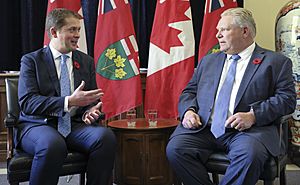
In 2018 and 2019, Ford was a strong critic of Prime Minister Justin Trudeau's Liberal government. He opposed the federal carbon tax. However, since 2020, journalists have noted a change in Ford's attitude. He has worked closely with Deputy Prime Minister Chrystia Freeland during the COVID-19 pandemic. In 2022, some described a "political bromance" between Ford and Trudeau.
After his 2022 election win, Ford's political views were described as centrist.
In 2018, Ford supported the economic policies of the Republican Party and U.S. President Donald Trump. He called his support for Trump "unwavering." However, when Trump announced tariffs on Canadian aluminum in 2020, Ford disagreed. After the 2024 U.S. election, Ford congratulated Trump. He said it was "time to bet big" on Ontario–US relations. But he strongly opposed Trump's new tariffs on Canada.
Ford called pro-Palestinian protests in Ontario "hate rallies."
Personal Life
Family
Ford is married to Karla Middlebrook. They have four daughters: Krista, Kayla, Kara, and Kyla.
Ford's mother, Diane, passed away from cancer in January 2020.
Health
Ford became an "ethical vegetarian" after working in a meatpacking plant as a teenager. While he no longer follows this strictly, he was still not eating red meat as of 2011.
Helping Others
In 2014, Ford and his mother donated $90,000 to Humber River Hospital. This was where Rob Ford was receiving care.
See also
 In Spanish: Doug Ford para niños
In Spanish: Doug Ford para niños


